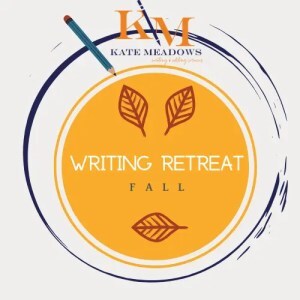Your Writing Retreat: 3 Ways to Step Away and Write
When you imagine a writing retreat, what comes to mind? Maybe it’s the click of keyboards as participants hammer out stories. Maybe it’s hours of quiet focus. Maybe it’s the beauty of a lake or a mountain view outside an enormous picture window.
Or, maybe the term “writing retreat” is new to you.
A writing retreat is a unique opportunity for writers to detach from every-day responsibilities and spend dedicated, uninterrupted time in a designated place, writing. Your sole job at a writing retreat is to write. There are no text messages to answer. There are no meals to plan. There are no kids to pick up from practice. The retreat is a date between you, your story (or story idea) and whatever medium you use to get that story down – a notebook, a laptop, a recording device.
But what does that look like, exactly? How do you organize a retreat, and how do you show up to the work?
The truth is, writing retreats can look a lot of different ways. I’ve structured my own retreats – 3-day solo getaways within 60 miles of my house to get the writing work done. I’ve met a dear writer friend halfway between her town and mine – in a state where neither of us lived – for a weekend of writing and reconnecting. I’ve packed a bag and met a half dozen other writers at a big cabin for two uninterrupted days of writing time and reflection.
What matters when it comes to a writing retreat is the act of stepping away from the daily grind and giving your writing the focused attention it deserves. Here are three types of writing retreats to try:
1. The Solo RetreatA solo retreat is the classic vision: you, your notebook or laptop, and the freedom of uninterrupted time. Sometimes what you need most is time alone. A solo retreat might be as simple as booking a night at a local hotel, borrowing a friend’s cabin, or even spending a day in a library with your phone turned off.
The gift of the solo retreat is silence. With no distractions, no obligations, and no one else’s schedule to consider, you can sink deeply into your work. A solo retreat also teaches you discipline—learning to sit with your project for long stretches and to trust your own rhythm without external cues.
Many writers find breakthroughs during these solo stretches, when the noise of daily life finally falls away. Many writers return from a solo retreat with not only pages written but also a renewed sense of who they are as a writer. It’s just you and the work—pure and simple.
2. The Duo Retreat: Accountability and Companionship
For some writers, solitude feels daunting. That’s where a retreat with a trusted friend or accountability partner can be transformative. You write in parallel—each focused on your own project—but you take breaks together, share meals, and check in on progress. Having another person nearby creates a gentle sense of accountability. When your partner is typing steadily across the table, you’re more likely to stay the course, too.
Duo retreats are especially helpful if you need encouragement but still want focus. They strike a balance between solitude and community, offering companionship without distraction. Many lifelong creative partnerships have grown from this kind of retreat, where encouragement and accountability weave together. When you get stuck, you’ve got a safe sounding board right there. You can bounce ideas off of each other and even read sections of your work out loud for feedback. Writing with a friend is a great way to buck the loneliness of the work and have a little (or a lot of) fun in the process.
3. The Community Retreat
Then there’s the magic of a larger retreat—gathering with a group of writers, all committed to moving their projects forward. Community retreats combine quiet writing time with the camaraderie of shared meals, conversations, and (often) inspiring talks. The energy is palpable—everyone is there for the same purpose: to write. You come for the words, but you leave with encouragement, friendship, and a renewed sense that you’re not walking this path alone. Writing may be solitary, but it doesn’t always have to be lonely.
Community retreats are structured to maximize progress while also fostering connection among writers. You’ll usually find a rhythm of inspirational talks, quiet writing blocks, and shared meals. The conversations—around the table, on a walk, over a cup of tea—often spark breakthroughs that no one could have found alone.
Our families and friends might cheer us on, but they don’t always understand what it’s like to wrestle with a sentence for an hour or to be haunted by a character who refuses to speak. At a retreat, though, you find yourself surrounded by people who get it. You don’t have to explain why you’re tired from “just thinking” all morning. No one blinks when you say you’re struggling with chapter three for the twelfth time. Around the table, you hear others voicing the same challenges you thought were yours alone. Suddenly, the weight lifts a little.
An Invitation to Write in Community
 The greatest gift of a community retreat is belonging. Writing may be a solitary act, but it’s not a lonely one when you know others are walking alongside you. Writers leave community retreats not only with words on the page but with friendships, accountability groups, and a deep sense that they are part of something bigger. If this speaks to you, I’d love to invite you to my upcoming one-day in-person writing retreat at Canyon Lake Resort in Rapid City, SD, on Saturday, November 1.
The greatest gift of a community retreat is belonging. Writing may be a solitary act, but it’s not a lonely one when you know others are walking alongside you. Writers leave community retreats not only with words on the page but with friendships, accountability groups, and a deep sense that they are part of something bigger. If this speaks to you, I’d love to invite you to my upcoming one-day in-person writing retreat at Canyon Lake Resort in Rapid City, SD, on Saturday, November 1.
This one-day retreat includes:
Brief inspirational talks about writingLots of quiet writing timeAn optional Pilates sessionOptional 1-1 coachingLunch, snacks, and drinks (or bring your own if you prefer)Come for the words, but stay for the conversations and the camaraderie. Writing may be done in solitude, but it flourishes in community.
Register here for the one-day in-person writing retreat on Nov. 1.
Regardless of how you step away and write, I promise you will find the time valuable. When it’s you and your words – with no other responsibilities or obligations pulling at you – you will find there is magic. There are insights waiting, and there are quite likely some surprises in that quiet, creative space.
*Have you ever treated yourself to a writing retreat? If so, what did that retreat look like and how did it help you move a writing project forward? Share in the comments or email me to let me know!
The post Your Writing Retreat: 3 Ways to Step Away and Write appeared first on Kate Meadows Writing & Editing.



